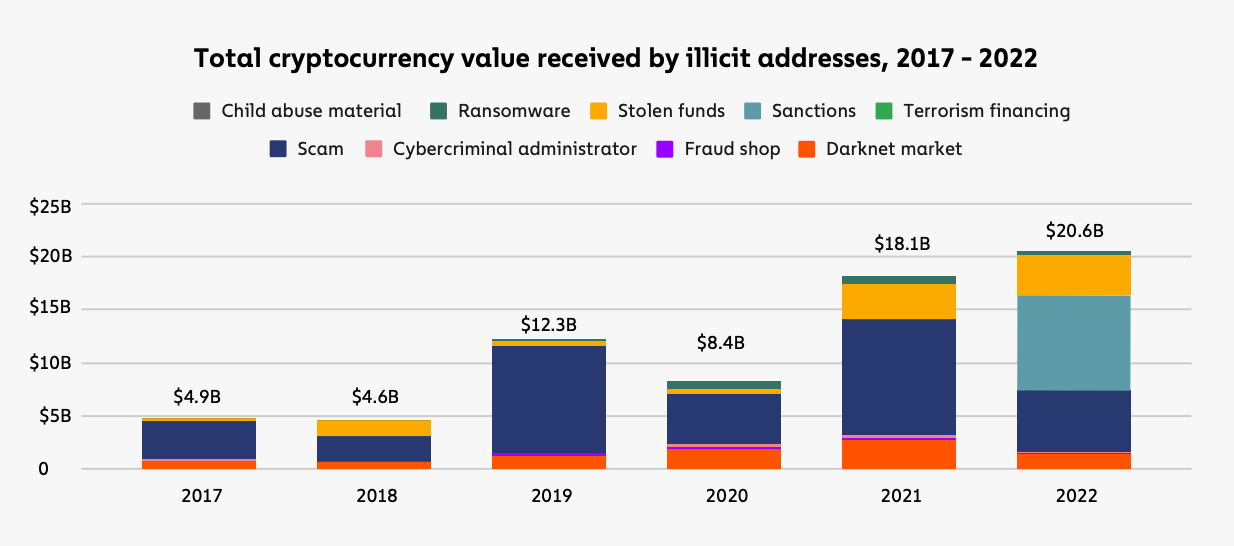How to avoid fraud in the crypto space

Where money is concerned, scams always follow. And the same is true with cryptocurrency. Last year, the total illicit transaction value for cryptocurrencies surpassed $20.6 Billion, reaching all-time highs, according to Chainalysis. Most of those duns were either the subject of scams or stolen funds. While it is true that the total scam volume has been declining since users are becoming more and more aware, innovation is rifle for bad actors.

The crypto market is gaining more popularity as we speak, meaning that scammers are on the lookout to exploit all the loopholes left or gullible people that get caught up in their lies.
We all know that like any financial service, the crypto industry is oversaturated with thieves and scammers as it is almost unregulated - some may say it's like the Wild West out here. But that's what keeps us going - the excitement and the thought that in the future this will be our chance to win the jackpot in some way.
Even though the crypto market is relatively novel, scammers are still doing it the old-school way, so here's a list of common crypto scams you should watch out for:
- Get rich quick or Investment scams - everyone should know that when a stranger tells you'll be rich with zero risks - they're probably trying to scam you. Watch out for these cold emails, messages on Telegram, or even your dating app's messages.
- Social media cryptocurrency giveaways - This seemingly 'once-in-a-lifetime chance may entice people to send assets immediately in hopes of a quick return. Since Elon Musk’s acquisition of Twitter you can no longer simply glance at a blue check after a name and be sure it’s a verified account because any Twitter Blue subscriber can pay for that mark for just $8. Before you trust any advice or ideas from what seems to be a verified account, look at their other posts, how long they’ve been active, and how many followers they have. A brand-new account with few followers that seems to only be shilling crypto projects is unlikely to be trustworthy.
- Phishing scams - In order to collect personal information, scammers send emails containing harmful links to phony websites. Do not enter secure information via an unsecured email link, in order to avoid these scams. Always go directly to the website, no matter how authentic the website or link appears to be.
- Rug-pull scams - Very common in the NFT market, this involves your investment in boosting some con artists' new project, an NFT like we mentioned, or a token in order to obtain money. Scammers steal money and then vanish with it. Because the code for these investments prevents customers from selling Bitcoin after they purchase it, they are left with a useless investment. Our only advice for this is - to do your homework before investing!
- Fake exchanges - Investors may be lured by scammers who make grand promises about different exchange rates and they often realize they have been deceived only when they lose their deposit. To avoid such scenarios, it's advisable to stick to reputable crypto exchange markets and conduct you own research by visiting industry websites to determine the exchange's legitimacy and reputation before sharing personal information.
- The MTM attack - Any information exchanged over a public network can be intercepted by a scammer. When a person is logged in, a thief can access this sensitive information by utilizing the man-in-the-middle attack approach. This is performed by intercepting Wi-Fi signals from nearby trusted networks. To avoid these assaults, the only way is to deploy a virtual private network to eliminate the man in the middle (VPN). The VPN encrypts all data transmitted, making it impossible for hackers to access personal information or steal cryptocurrency. Here's a video explaining more briefly the MTM attack:
What do you want to read next?
As crypto evolves, scammers continue to do so as well. While adopting crypto has become important in today’s digital world, protecting your business against crypto scams is just as important as safeguarding your physical assets.
What scam do you think was the largest of all time? Leave us a comment on Twitter and let's start a chat. If you have any other ideas in mind for a new educational blog - the HYVE team is here to help you grow and learn more about new topics. It's time to evolve and immerse yourself in the crypto world!
